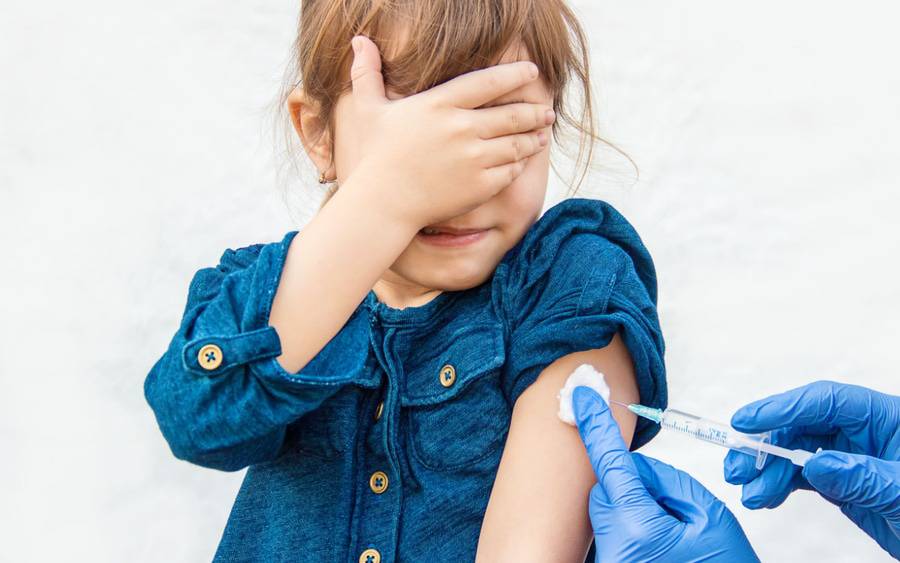8 Pediatrician-Approved Ways to Help Overcome Your Child's Fear of Shots
Who guides your child’s vaccine care?
Scripps pediatricians follow guidance from the American Academy of Pediatrics (AAP), whose recommended immunization schedule protects against 18 diseases and is based on decades of scientific research and safety monitoring.
The California Department of Public Health (CDPH) and other West Coast public health agencies continue to support these evidence-based recommendations.
With trusted experts guiding vaccine care, the next step is helping your child feel more comfortable and confident on shot day.
Follow these tips to help prepare your child for vaccinations:
1. Prepare your child in an age-appropriate way
Toddlers (ages 2-3)
Young children focus on the present and do best with little notice. Telling them too early about a vaccine injection can make them anxious. Instead, explain shortly before or during the visit. Use calm and reassuring words:
“You will get some shots today. They are little pokes that might hurt for a minute, but mommy or daddy will be here to help you to be brave. You need them to keep you healthy, so you don’t get sick.”
Holding your child on your lap, hugging them close or holding their hand can help them feel safe during the injection.
Preschoolers and older children (ages 4+)
Children in this age group often do better if they prepare a day or two before their doctor visit. Be honest and reassuring. Avoid making promises like “you won’t be getting any shots” since vaccine schedules can change from time to time.
Explain the purpose of vaccines in simple, concrete terms. You might say:
“We will be seeing your doctor in a few days for your check-up. You will need to get some shots that day. Vaccine shots are special medicines that will help you to stay healthy.
"Most children need some shots before they start kindergarten. They do hurt, but only for a short time. I will help you to be brave. You will be OK.”
Practicing coping skills at home can also be helpful. Taking deep breaths can help children feel calm. Relaxing their arms is another way to feel better. Counting slowly can also help.
On shot day, you can gently remind them that you practiced this and they know what to do.
2. Distraction: Give your child something else to think about
During the actual time of vaccination, most children do best if they do not see the needle or are somehow distracted.
During the injection, encourage your child to focus on something else, like:
- Singing a favorite song
- Blowing bubbles or a pinwheel
- Watching a short video
- Listening to a story or joke
- Counting objects in the room
Some pediatric clinics have a child life specialist, a trained professional who helps children cope with medical experiences. They use age-appropriate preparation, play and relaxation techniques to reduce fear and anxiety.
Families can also ask about non-medication comfort tools. Devices such as Buzzy, which uses cold and vibration, or ShotBlocker, which applies gentle pressure, may help reduce discomfort when combined with distraction and supportive care.
3. Keep it quick, then comfort
Sometimes the event is too stressful for distraction to be effective, but the injection itself can still be quick. After their vaccinations, many children respond with surprise, saying things like, “It’s over?” or “That’s it?”
“Fear and anxiety about the event are often greater than the pain of the shots themselves,” Dr. Rubin explains. “When multiple vaccinations are given at one visit, it’s best to complete them as efficiently as possible and then focus on comforting the child afterward.”
4. Celebrate the milestone (without overdoing it)
The sting of booster shots can be eased with a small reward. Celebrating this important childhood milestone helps children end the visit on a positive note.
A simple, enjoyable activity shared by a child and parent — such as going to the park or enjoying an ice cream treat — can be highly effective.
Be wary that a prize that is too costly or big may actually increase a child's fear of their shots. They may think, “It must be really bad if Dad says he will buy me a new bike for getting my shots.”
5. Parental attitude check: Stay cool, calm and collected
Children often take emotional cues from their parents. So, it’s important to remain calm and supportive. Be direct and clear when talking about what to expect.
If one parent is very anxious about needles, it might help for the other parent to accompany the child instead. For children with special needs or heightened sensitivity, having an additional support person present can also be helpful.
6. Topical medicine: Numb the location beforehand
Over-the-counter numbing creams that contain lidocaine may help reduce surface discomfort when applied 30–60 minutes before the appointment.
Because vaccines are given into the muscle, these creams do not eliminate all pain. However, some children find them helpful. Ask your pediatrician how to use them correctly.
7. Use oral pain medicine after, not before
Acetaminophen (Tylenol) or ibuprofen (Advil) can help with soreness or fever after vaccination.
Experts recommend not giving these medicines before shots as they may slightly reduce the body’s immune response. If needed, medication can usually be given a few hours afterward and continued for up to 48 hours. Always check with your child’s doctor to confirm the correct dose based on your child's age and weight.
8. Ask about needle-free vaccine options
Some vaccines may be available in needle-free forms, such as a nasal spray flu vaccine for eligible children. This option can be especially helpful for children with significant fear of needles.
Not all vaccines can be given this way, and nasal vaccines are only recommended for certain ages and health conditions. Your pediatrician can explain whether a needle-free option is appropriate for your child and which vaccines still require an injection.
